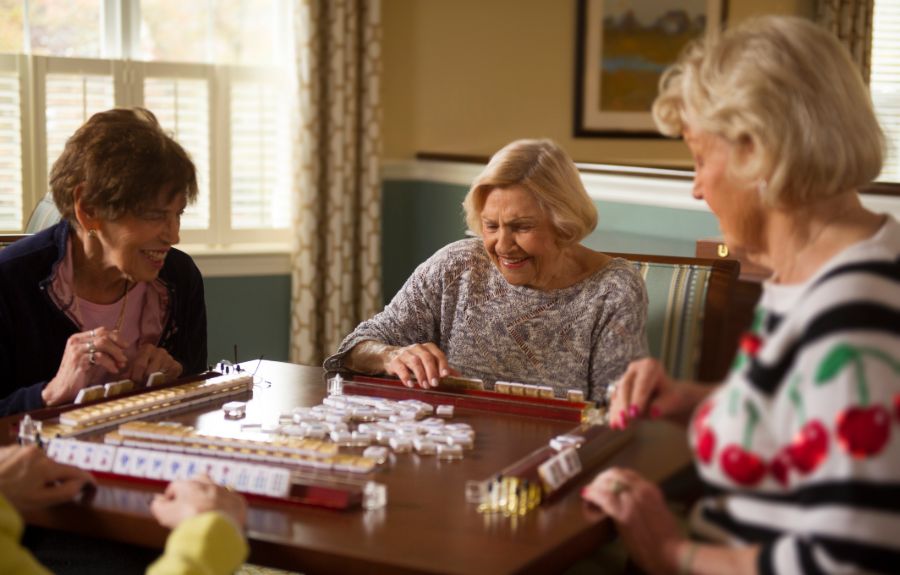While, for many people, the holiday season is the most wonderful time of the year, for some older adults, it's the most painful time. Seniors can be especially vulnerable to depression as the festivities and cultural expectations around holidays start to ramp up.
This is often true for older adults who live alone and for those who experience winter-related Seasonal Affective Disorder (SAD). Other factors that put seniors at risk for holiday depression include:
- Dealing with chronic health conditions, limited mobility or severe pain. About 80% of older adults have at least one chronic health condition, and 50% have two or more, according to the Centers for Disease Control and Prevention.
- The loss of a child, spouse, partner, dear friend or beloved pet.
- Geographic isolation from family members or lack of a social support system.
- Anxiety over financial issues.
- Moving from work into retirement, which can lead to a feeling that they no longer have a purpose in life.
- A personal history with depression.
Signs of depression to watch for around the holidays
Many seniors are good at hiding their depression symptoms and reluctant to talk about how they're feeling. Perhaps they don't want to be a burden to loved ones, or maybe they're among the 62% of older adults who don't believe depression is a health issue.
Additionally, the symptoms of depression in seniors are often different from those displayed by younger people. Here are some of the most common things to watch for if you suspect your elderly parent is dealing with depression around the holidays.
Personality changes
Some seniors may be more prone to frequent tearfulness when depressed, but not everyone exhibits sadness as the primary symptom. If your normally optimistic-to-a-fault mother suddenly starts sounding bitter and pessimistic, she could be using that to mask feelings of hopelessness, helplessness and worthlessness.
If the loving father and patient grandfather you've know all your life becomes increasingly angry, irritable and hostile toward you and your children, this may be his way of expressing depressed feelings. You may find that your once-doting parent withdraws from your relationship, turning down your invitations for holiday get-togethers and avoiding the phone.
Physical symptoms
Decreased energy and frequent fatigue are common physical signs that your loved one may be depressed. Changes in appetite and weight are also indicators. Is your normally rail-thin mother suddenly gaining weight? Has your three-meals-a-day father stopped eating and become nearly anorexic?
Persistent aches or pains that don't get better, even with treatment, can alert you to an underlying depression. These include:
- Headaches and migraines
- Digestive system problems
- Joint and back pain
- Chest pain
Cognitive signs
Harvard Health Publishing notes that depression can take a big toll on cognitive functioning in the following ways:
- Makes it harder to pay attention and focus
- Affects decision-making skills
- Impairs memory
- Slows information processing
- Lowers cognitive flexibility, the ability to adapt goals and strategies to changing situations
- Impairs executive functioning, the ability to follow all the steps required to get something done
Watch for signs that your parent is having cognitive issues that may manifest in things, such as unpaid bills, unopened mail and problems with bank accounts or risky financial decisions.
Lifestyle and habit changes
Along with a marked loss of interest in activities that once brought joy, such as putting up a holiday tree, baking cookies or wrapping gifts, you may notice your loved one neglecting her personal care. Ask yourself:
- Has the daily shower become a weekly sponge bath in the sink?
- Does it appear that she's intentionally forgetting to take her medications?
- Has her alcohol intake escalated dramatically?
Watch for a change in sleep patterns too. Is chronic insomnia making it difficult for your parent to fall or stay asleep? Maybe it's the opposite, and excessive sleeping is eating up most of the day.
How to help
Once you become aware that your elderly loved one may be experiencing depression, offer emotional support. Be patient and compassionate, and provide a listening, nonjudgmental ear. Older adults often don't realize they're depressed, so you may need to bring up the subject in a gentle, nonthreatening way, sharing some of the changes you've noticed in their behavior and mood.
Extend hope by assuring your parent that depression is a treatable medical illness and not something to be ashamed of. Encourage your mother or father to make an appointment with a primary care provider, and offer to go along for moral support if they're comfortable with that.
This helps you ensure that they get an accurate diagnosis and an appropriate treatment plan. It also lets your parent know they're not in this alone and you're a key component of their mental health team.
If you'd like to learn more about what Brightview Senior Living offers seniors who are making the transition from living alone to joining a senior living community, we invite you to check out The Brightview Experience or Find a Community today to schedule a personal visit.
DOWNLOAD OUR CHECKLIST FOR MOVING INTO A SENIOR INDEPENDENT AND ASSISTED LIVING COMMUNITY
As you visit a community, evaluate as much as you can. Use our checklist to be sure you’ve asked all the right questions.
Download your Complimentary Community Visit Checklist

